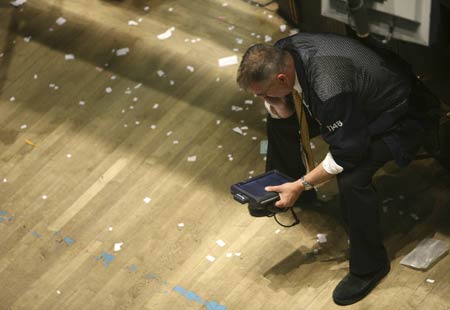 |
|
A trader works on the floor of the New York Stock Exchange, October 15, 2008. US stocks tumbled on Wednesday as bleak economic data fed worries that all the efforts to unlock credit markets may not stave off a severe recession. [Agencies]
|
Mark Coffelt, portfolio manager at Empiric Funds, said moves by European and US government officials to begin investing directly in banks are easing worries about credit. But the steep pullback in stocks that began last month after the credit markets lurched to a near standstill has now created worries that consumers will spend less after seeing the value of their retirement accounts and other investments drop.
"Markets abhor uncertainty and so we got a lot of that resolved this weekend and we got the reward Monday but now people are saying 'OK, now what is the economy going to do?'"
"We're definitely going to get a slowdown from the terror of going through that," Coffelt said.
The Dow ended down 733.08, or 7.87 percent, at 8,577.91. On Monday, Sept. 29, the Dow had its largest point drop 777.68. Wednesday's percentage drop was the biggest since the 8.04 percent of Oct. 26, 1987, which followed Black Monday, the Oct. 19 crash that sent the blue chips down 22.6 percent in a single session.
The Dow's massive decline Wednesday marks its 20th triple-digit move in 23 sessions.
Broader stock indicators also skidded. The Standard & Poor's 500 index fell 90.17, or 9.03 percent, to 907.84, and the Nasdaq composite index fell 150.68, or 8.47 percent, to 1,628.33.
It was the lowest close for the Nasdaq since June 30, 2003, when the index finished at 1,622.80. The Dow and the S&P 500 are also at mid-2003 levels.
The Dow is down 39.4 percent from its Oct.9, 2007 closing high of 14,164.53. The S&P is down 42 percent from its high at the same time of 1,565.15. The Nasdaq's record high was 5,048.62, during the dot-com boom that swelled the index to levels it has not come close to regaining after the high-tech bubble burst.
US stock market paper losses came to $1.1 trillion Wednesday, according to the Dow Jones Wilshire 5000 Composite Index, which represents nearly all stocks traded in America.
Doubts about the US economy were already surfacing in Tuesday's session, when investors halted an early rally and began collecting profits from stocks' big Monday advance. Wednesday's data confirmed the market's fears that the economy is likely to remain weak for some time, and that corporate profits are likely to suffer.

